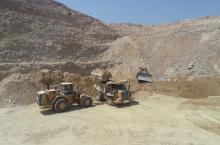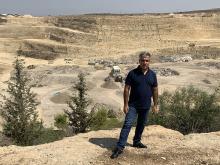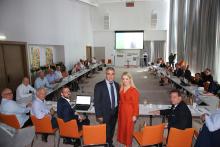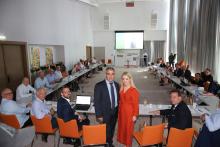Antonis Latouros is a high achiever. UEPG’s new president, who is also president of the Cyprus Aggregates Producers Association (CAPA), has built his hugely successful quarrying enterprise, the Latouros Group, into a business selling around 1.75 million tonnes of sand/aggregates and gypsum products produced each year at the group’s four quarries – generating around €15 million in annual sales revenue.
Having served for three years as UEPG 1st vice president under Thilo Juchem, a German national, who completed his three-year UEPG presidential term in June, Latouros has a clear vision of what he wants to bring to the coveted top role, and how he will lead from the front in delivering the association’s recently agreed 2021-2024 objectives.
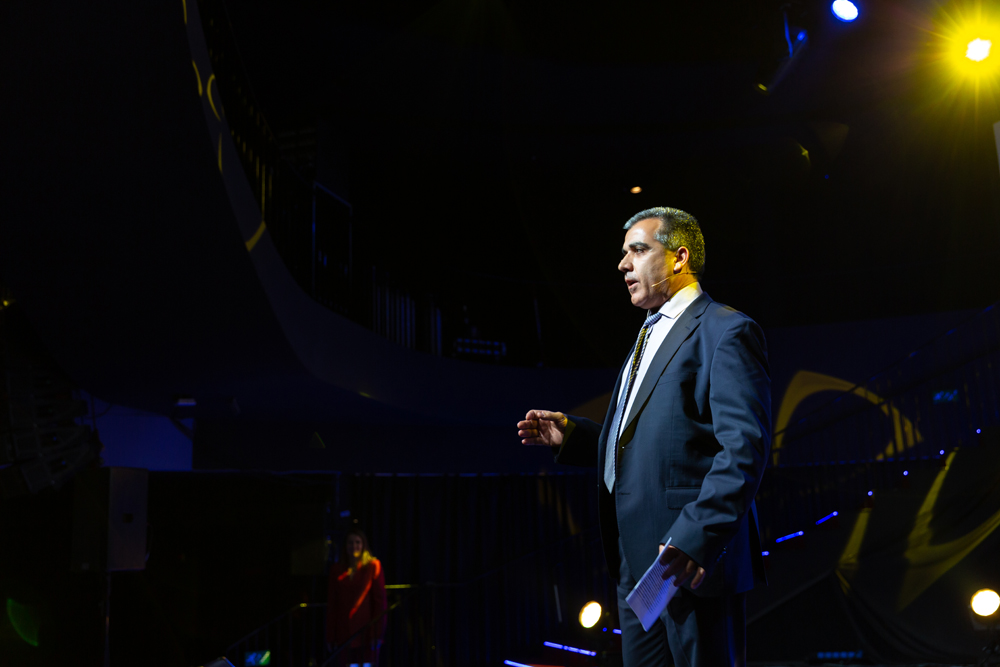
“We will be strengthening full UEPG membership and enlarging the affiliated membership to ensure a solid industry representation and a sound and stable financial framework which will allow us to increase our Brussels-based General Secretariat,” says Latouros. “For me, it is all about teamwork, and we need and must insist on having a bigger UEPG team. It is very important that our members are fully informed about the work we are doing, lobbying EU policymakers on their behalf.
“We will also be fully using modern communication, including social media, to stress the importance of aggregates for economic growth and daily life. We cannot live without aggregates, and people need to appreciate this.”
Latouros used his presidential inauguration speech at the UEPG Delegates Assembly held on Friday 18 June in Kiel, northern Germany, to stress that his three-year term as president would reflect that the European aggregates industry mostly consists of SMEs (small & medium-sized enterprises) and would make sure that everyone feels “her or his voice is heard”.
Latouros says eight key objectives agreed by the UEPG governing board during a COVID-19-necessitated virtual meeting in April this year are featured in the association’s new three-year business plan. The UEPG will look to ensure the highest standards for healthy, safe and pandemic-resilient workplaces in the industry; promote compatibility/co-existence of responsible aggregates extraction and environmental protection/management; demonstrate the low-carbon footprint of the industry and its contribution to climate-change mitigation and adaptation; and contribute to the EU circular economy through progress on raw materials efficiency and recycling.
UEPG, which draws its members from 26 countries, will also look to ensure quality through improvement of technical standards; develop skills and better job opportunities in sustainable extraction, biodiversity and restoration landscaping; promote better implementation and regulatory enforcement of existing EU legislation; and foster cooperation with other industry sectors, NGOs (non-governmental organisations) and stakeholders through co-funded projects.
Latouros stresses the robust nature of the European aggregates industry has been demonstrated by the modest COVID-19 lockdown-induced 3% drop in aggregates production in 2020, compared to 2019’s 4.2 billion-tonnes aggregates output of the EU27, UK, EFTA (European Free Trade Association – Iceland, Lichtenstein, Norway and Switzerland), plus Russia, Ukraine, Belarus, Moldova, Turkey, Israel and the Balkans.
UEPG has, notes Latouros, issued a health and safety guidance document on COVID-19 management to help the European aggregates industry to effectively tackle challenges related to the running of aggregates extraction sites during the continuing pandemic.
“Since the first wave of the pandemic and linked lockdowns, aggregates markets are getting back to normality. I believe that 2021 will cover whatever loss we had in 2020, compared to 2019,” says Latouros, optimistically.
Latouros’s natural charm, straight-talking approach to business, and deep understanding of geology and commercial aggregates production, make him an ideal UEPG president. His career in the aggregates industry began in the early 1990s when he joined his father, Costas, who was running a then small quarry. Fast-forward to the present day and the Latouros Group (LG) is a big independent player in the southern Europe aggregates market. It includes Latomia Latouros, which operates Latouros Group’s flagship calcareous limestone-based sand quarry in Dali, located just under 20kms south-east of Cyprus’s capital, Nicosia. The group also operates another calcareous limestone-based sand quarry, Elmeni (Latomia), less than two kilometres from the Dali site.
Latomio Pyrgon produces diabase rock sand/aggregates of various sizes at Pyrga village. Latouros Gypsum is LG’s gypsum quarry business, with its admirable 95% purity gypsum exported via Larnaca port to customers in countries including Lebanon and Israel. A fourth firm, Recycling Point – Latouros & Xenis Bros, is a construction and demolition (C&D) waste recycling business, 51% owned by LG.
LG also has a 30% stake in Veltia Cyprus – Labs for Life, a holistic chemical laboratory. Veltia is a member of the Tentamus Group – an international network of 75 labs with headquarters in Berlin, Germany.
With the presidency demanding a lot of his time, 51-year-old Latouros can count on the support of his daughter, Maria, an industrial engineer with a Master’s in Management, who is a member of LG’s executive committee. Kyriakos Constantinou, fiancé of another of Latouros’s three daughters, Stavroulla, and a civil engineer with a Master’s in Project Management, is also on the group’s executive committee. Constantina, Latouros’s youngest daughter, is an undergraduate at King’s College, London. She plans to take up a role within LG following her studies.
“I have started planning and preparing the generation succession in my group, with the executive committee running the whole business. The executive committee is acting as a CEO of the group. As well as myself, Maria and Kyriacos, Christos Zapitis, a mathematician and chartered accountant with great experience in business development and financials, is also on the committee. Creating this committee is already freeing me up to fully focus on my new duties as UEPG president.”
Latouros also praised the understanding and support of his wife, Eleni, as his UEPG presidential work will require him to be away from home more often as he travels to Brussels and other parts of Europe on association business.
Commenting on what it means to him to become president of such a critical industry association, the first Cypriot national to hold the role, Latouros says: “It is a very big honour for me personally and for Cyprus and the Cypriot aggregates industry. I think that my UEPG presidency shows that the association is as much about representing quarry operators in smaller countries as it is those in larger ones.
“Being part of the UEPG is like being part of a very big family, a very big school – given there are 26,000 aggregates production sites in Europe. You see very good examples of working practices in many countries, and I think in Cyprus we have much to show that can set an example to other countries.”
During his time as UEPG 1st vice president, Latouros represented the UEPG in Geneva, Switzerland, at the May 2019 launch of the United Nations’ (UN) report on sand scarcity. At the 6th China International Aggregates Conference in Wuxi in December 2019, Latouros also gave a presentation on the new challenges facing the European aggregates industry and the need for the industry to work closely with European Commission president Ursula von der Leyen and her team.
“Climate change is a big issue for the European Commission and for the European aggregates industry. In UEPG, we want to communicate that we are part of the solution to this problem, not a cause of it. Aggregate production generates very low CO2 emissions, and the industry is one step ahead regarding the environment and the quality of our operations.
“It was commented on in the UN report on sand scarcity that the work UEPG members are doing is a very good example for other world region quarry operators to follow.”
Latouros is also keen for the UEPG to address significant differences across Europe in how quarry operating licences are issued, by initially identifying and then recommending best practice in this area. “It’s a big issue for everybody,” he stresses.
And how does Latouros see the European aggregates industry’s long-term future? “Humanity will never stop needing aggregates. Because recycled aggregates can, in my view, make up a maximum of just 15% of total aggregates demand, there will always be a strong demand for primary aggregates. I think European quarries in ten years will be zero-carbon emission sites. The electrification of quarry machines will be very common. Quarry-site health and safety will also be even better in a decade. It is and will remain a key part of UEPG’s work.”
Welcoming Latouros’s appointment as UEPG president, Dirk Fincke, secretary general of UEPG, said: “Antonis is an excellent networker as he impressively demonstrated in Cyprus with his appearance on national TV and in the press [to promote the new UEPG presidency and 2021-2024 business plan] and in meetings at the highest political level. He will extend his EU network in Brussels and attend regular meetings with EU Institutions. He is keen to progress on key EU policies and to show that entrepreneurs from smaller countries and smaller associations have no reason to believe that their voice in Brussels will not be heard.”
Thilo Juchem served as UEPG president in the three years to June 2021. A board member of MIRO, the Germany Aggregates Federation, Juchem is manager and liable partner of the Niederwörresbach, Rhineland-Palatinate-based Juchem Gruppe, a longstanding, medium-sized, family-owned company, whose activities cover quarrying, asphalt mixing and road construction.
After congratulating his UEPG presidential successor, Juchem spoke at the recent UEPG Delegates Assembly about the exceptional circumstances that had been the backdrop to the second half of his presidency. He stressed that the COVID-19 pandemic had proven the resilience of the world’s largest non-energy extractive industry and the flexibility of both UEPG’s Brussels-based team and every association member.
Latouros will draw inspiration from these resilient and flexible qualities as he and his soon-to-be-enlarged Brussels-based UEPG team get to work on delivering the association’s rightly ambitious 2021-2024 business plan.

